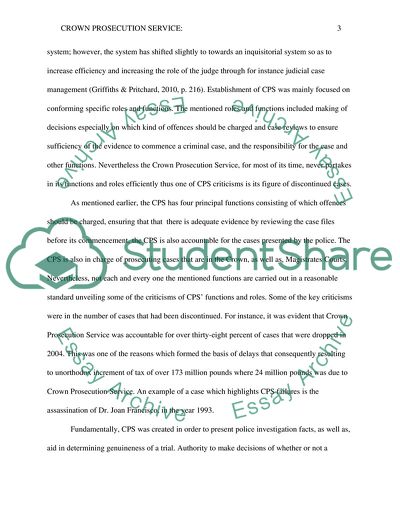Cite this document
(“The Crown Prosecution Service (CPS) is an important part of the Essay”, n.d.)
The Crown Prosecution Service (CPS) is an important part of the Essay. Retrieved from https://studentshare.org/law/1663194-the-crown-prosecution-service-cps-is-an-important-part-of-the-english-criminal-trial-process-critically-evaluate-the-role-of-the-cps-ensuring-you-include-any-areas-of-criticism-and-calls-for-reform
The Crown Prosecution Service (CPS) is an important part of the Essay. Retrieved from https://studentshare.org/law/1663194-the-crown-prosecution-service-cps-is-an-important-part-of-the-english-criminal-trial-process-critically-evaluate-the-role-of-the-cps-ensuring-you-include-any-areas-of-criticism-and-calls-for-reform
(The Crown Prosecution Service (CPS) Is an Important Part of the Essay)
The Crown Prosecution Service (CPS) Is an Important Part of the Essay. https://studentshare.org/law/1663194-the-crown-prosecution-service-cps-is-an-important-part-of-the-english-criminal-trial-process-critically-evaluate-the-role-of-the-cps-ensuring-you-include-any-areas-of-criticism-and-calls-for-reform.
The Crown Prosecution Service (CPS) Is an Important Part of the Essay. https://studentshare.org/law/1663194-the-crown-prosecution-service-cps-is-an-important-part-of-the-english-criminal-trial-process-critically-evaluate-the-role-of-the-cps-ensuring-you-include-any-areas-of-criticism-and-calls-for-reform.
“The Crown Prosecution Service (CPS) Is an Important Part of the Essay”, n.d. https://studentshare.org/law/1663194-the-crown-prosecution-service-cps-is-an-important-part-of-the-english-criminal-trial-process-critically-evaluate-the-role-of-the-cps-ensuring-you-include-any-areas-of-criticism-and-calls-for-reform.


